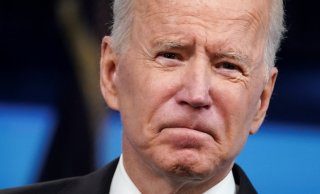Joe Biden's Greatest Enemy Isn't China or Russia (It's Much Worse)
For most of our nation's history, the federal government's public debt-to-GDP ratio did not exceed 40%. The total federal debt-to-GDP was 129% as of December 31, 2020.
Washington policymakers are rightly concerned about a rising China, the theft of American intellectual property, and cyber-attacks conducted by China, Russia, Iran and others, including the recent Colonial pipeline attack. These represent real threats to our economic growth, competitive posture, and national security. Unless we get our spending under control, we will not have the means necessary to meet these rising geopolitical challenges. That’s why the greatest threat to our national security may be our own fiscal irresponsibility.
For most of our nation's history, the federal government's public debt-to-GDP ratio did not exceed 40%. The clear exception was the debt we accumulated to fight and win World War II, but due to strong economic growth and restoration of fiscal discipline, federal public debt-to-GDP declined to less than 40% by 1980. Today, given current demographic trends and the expansion of mandatory spending programs since WWII, according to the Federal Reserve Bank of St. Louis, the total federal debt-to-GDP was 129% as of December 31, 2020. This was before the $1.9 trillion American Rescue Plan Act of 2021! We cannot grow our way out of our financial hole. Tough choices will be required. One of Congress's most important jobs is to control the power of the purse. It’s time for Congress to take this responsibility seriously and get our nation’s finances in order.
President Clinton and Speaker Gingrich worked hard to rein in federal spending in the late 1990s. Yet just when we thought the era of big government was over, Congress abandoned fiscal discipline and, in 2003, passed a massive expansion to Medicare. This, in combination with increased defense spending, a tax cut, and the 2008 housing crisis, significantly increased federal unfunded obligations and debt-to-GDP levels.
Add the trillions of dollars spent in the name of combatting the pandemic, and our country is in unprecedented territory. Federal public debt-to-GDP levels are now at an all-time high and are projected to increase dramatically in the future. Despite that fact, the Biden Administration wants to grow government even more!
Any Economics 101 course will tell you that excessive public debt-to-GDP levels result in reduced economic growth rates over time. And the United States debt level has already surpassed our total GDP and is rising. This is not the path we want our country to take or the inheritance we want to give future generations of Americans. We know this will mean less opportunity for American families and workers and put the American dream further out of reach.
Most concerning is what our out of control spending means for our national defense. According to some recent estimates, together, China and Russia spend more on their military than the United States. It is estimated that Russia spends more than $200 billion on defense, and China is spending an estimated $604 billion. This is a combined $804 billion — well higher than the United States defense budget of $741 billion. What is China doing with its massive expenditures? They are rapidly closing the gap between their military capabilities and ours. The United States cannot afford to be left behind, and waiting to fix this problem is not an option.
Instead of reining in spending, however, the Biden Administration is relying on new and unproven economic theories to justify their fiscal free for all. Current advocates of the new Modern Monetary Theory assert that deficits and debt are not a problem for the United States, absent excess inflation. This unproven theory provides an excuse for more fiscally irresponsible actions—the long-term consequences of which are hidden by current low interest rates. This is downright dangerous.
The recent April inflation announcement makes clear that the United States is not exempt from the laws of prudent finance. Inflation pressures are likely to increase when the economy begins to fully recover from COVID-19. Rising interest rates will follow, resulting in escalating interest payments. Shockingly, according to the non-partisan Congressional Budget Office (CBO), the federal government’s fastest growing projected expense over the next ten years is interest, for which we get nothing!
We must re-prioritize and constrain discretionary spending, revise social insurance programs to make them solvent, sustainable, and secure, and raise additional revenues in a competitive and fair manner. All these actions must be done in a way that increases sustainable economic growth by reducing public debt-to-GDP levels.
Our backgrounds in the private sector and in national security mean that we understand the severe danger our country faces and will continue to face unless something changes. Congress must rein in spending, or our country will face dire consequences. It’s important to address today’s challenges and take steps to help create a better tomorrow. Congress must get serious about fiscal responsibility—the time to address our stewardship responsibilities is now.
Rep. Mark Green is a successful business leader, decorated combat veteran, and ER physician. After his service in the Army, he founded a healthcare company that grew to over $200 million in annual revenue by its eighth year. He serves on the House Armed Services and Foreign Affairs Committees.
Hon. David M. Walker is a Distinguished Visiting Professor and Crowe Chair at the U.S. Naval Academy. He is also the immediate former Comptroller General of the United States.
This article first appeared at Real Clear Defense.
Image: Reuters.

